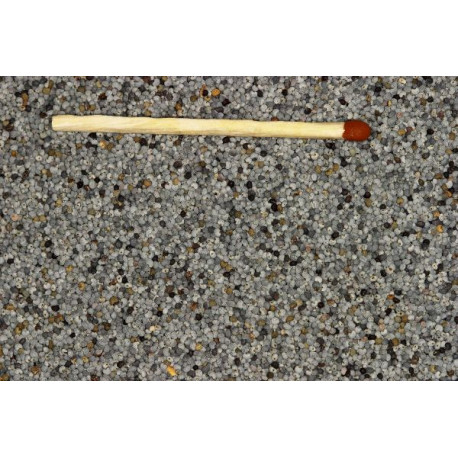



Reference: 160403
Thanks to its small black or pretty electric blue seeds, the poppy is recognizable among thousands. A cousin of the poppy, the poppy is known for its content of good fats and micronutrients essential for the proper functioning of the body.
Thanks to its small black or pretty electric blue seeds, the poppy is recognizable among thousands. A cousin of the poppy, the poppy is known for its content of good fats and micronutrients essential for the proper functioning of the body.
Characteristics of the poppy:
Source of unsaturated fats;
Rich in iron;
Excellent source of vitamins and minerals;
Promotes cardiovascular health;
Regenerating properties.
Carrot seeds are very rich in vitamins with a high proportion of vitamin A and carotene, as well as vitamin B, calcium and valuable carbohydrates.
Dari, also known as sorghum, millet, is a variety of seeds that is attached to millet varieties. The dari has the size of the hemp seed. The seed is native to the warm regions of Australia, Asia, Africa and South America. There are three varieties: white, yellow and red-brown dari. It should be noted that light dari is given more value than red-brown dari. As far as the food value in particular is concerned, there is not the slightest difference. In addition, the red-brown dari is well appreciated by agapornis. Dari can be compared to wheat in terms of starch content. The seed has a favorable composition of amino acids. The protein present in the dari has a particularly high leucine content.
The 1 kg white Perilla from the Manitoba brand is a high-quality food specially designed for birds.
Features and Benefits:
- Natural and Pure: White perilla is a natural, pure, and untreated seed, offering a healthy source of nutrition for birds.
- Rich in Nutrients: It is particularly rich in omega-3 fatty acids, essential for the overall health of birds, especially for their cardiovascular and immune systems.
- Plumage Health: Regular consumption of white perilla helps maintain shiny and healthy plumage thanks to its nutritional properties.
Millet is used in the diet of all birds: straight beaks and hooked beaks. In bunches, it's a treat they love.
Cluster millet has a good protein and carbohydrate content and also contains a large number of amino acids. Ideal for distracting your birds and thus avoiding pecking (feather pulling).
Niger, birdseed rich in phosphorus and calcium. Niger seeds (or nyjer seeds) are fine seeds rich in oil. They come from Guizotia abyssinica (also known as Guizotia oleiferous). The niger is highly prized by most birds, goldfinches and siskins love it.
The seed is mainly grown in India, Burma, Ethiopia and Nepal. Niger is an oilseed with a high fat content (38-43%) and protein content (23%). It provides quality food for all species of wild and forest birds, both in dry and sprouted form.
Niger is one of the few birdseeds with a good ratio of calcium to phosphorus.
Improves liver and overall health of birds.
Suitable for a wide range of birds, including parrots, canaries, budgerigars, and other exotic birds.
Benefits for birds:
- Liver support.
- Detoxification: Helps eliminate toxins from the liver and improves digestion.
- Strengthening the immune system.
Instructions for use:
Dosage: Add a small amount (usually a teaspoon per day) to the birds' usual seeds. The amount may vary depending on the size and specific needs of the birds. Can be mixed with the birds' daily food.
Precautions:
Store in a cool, dry place, away from moisture and direct sunlight.
Flaxseed is composed of 40 to 45% oil and 25% protein. Flaxseed keeps very well. In particular, it contains two fatty acids with similar names (and whose root is the word "flax"), linolenic acid (an omega 3) and linoleic acid.
The seed is used in animal feed, especially for laying hens whose omega 3 content is to be increased.
Through these properties, this seed promotes digestion.
Premium high-quality, high-fat seeds
- With a high content of vitamin E, B9, B5, B6, B1, B2, B3 and vitamin K.
- It has antioxidant properties.
- Excellent energy contribution.
- Rich in calcium, potassium, magnesium, phosphorus, protein, zinc, thiamine, pectin (cleanses the body).
The canary seed is a grass, an annual plant up to 1m tall, the seeds being found in the inflorescences. These seeds represent a significant fraction of the majority of bird mixtures.
• Excellent for canaries, European and exotic birds, wavy parakeets and large parakeets.
• EXTRA canary seed has undergone extra cleaning and is of exceptional quality. Unique on the market!
Pine seeds are a good source of Phosphorus, Magnesium, Zinc, Manganese, Copper, Iron, Vitamin E, K, B1, B2, B3, B9.
Carrot seeds are very rich in vitamins with a high proportion of vitamin A and carotene, as well as vitamin B, calcium and valuable carbohydrates.
Properties of Pine or Larix seeds.
Anti-inflammatory, analgesic, antispasmodic,
Antiseptic, anti-infectious (pneumococci),
Decongestant of the small pelvis and prostate,
Diuretic
Expectorant, tonic for the respiratory organs.
Pine seeds are a good source of Phosphorus, Magnesium, Zinc, Manganese, Copper, Iron, Vitamin E, K, B1, B2, B3, B9.
A 100% natural product that is mixed with breeding or with food; It doubles in size by adding water.
Carrots are very rich in vitamins with a high proportion of vitamin A and carotene, as well as vitamin B, calcium and valuable carbohydrates.
Peeled peanuts are very popular treats for parrots.
They are to be distributed sparingly because they are rich.
Ideal food to fill your wild bird dispensers, they will bring the necessary fat to the birds to spend the winter more easily.
The favorite of chickadees and a real treat for many birds.

Thanks to its small black or pretty electric blue seeds, the poppy is recognizable among thousands. A cousin of the poppy, the poppy is known for its content of good fats and micronutrients essential for the proper functioning of the body.
